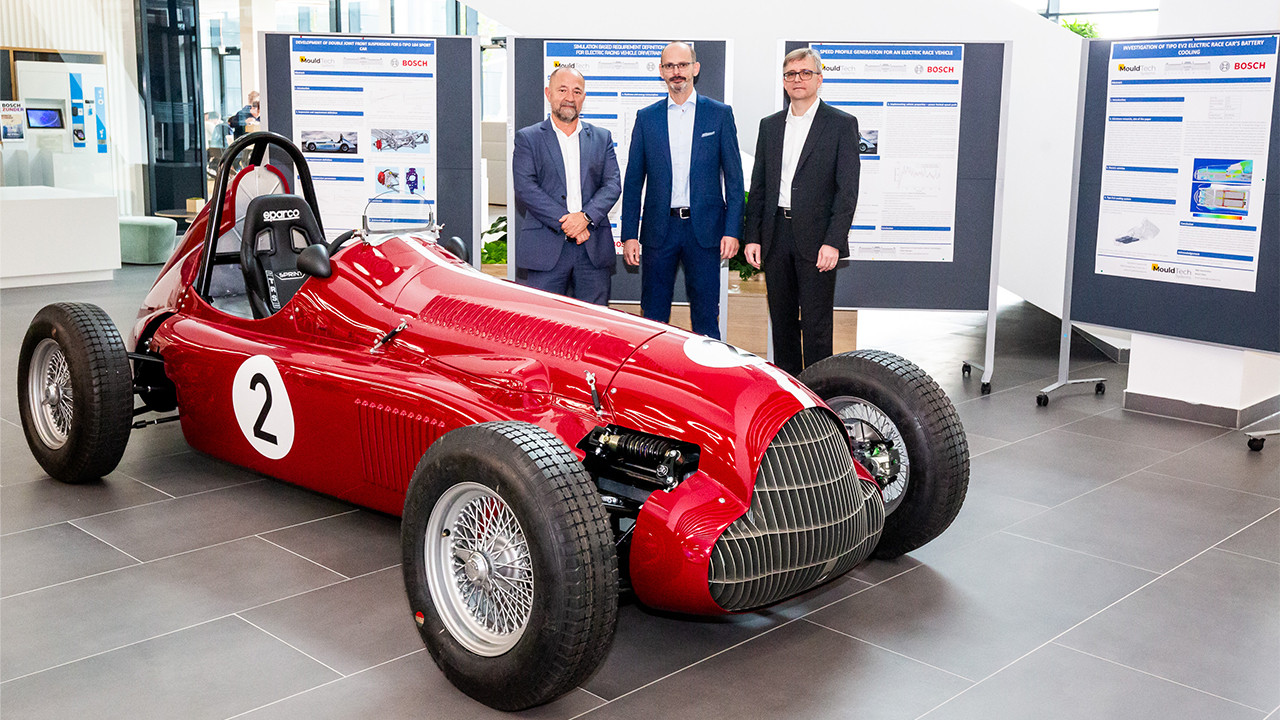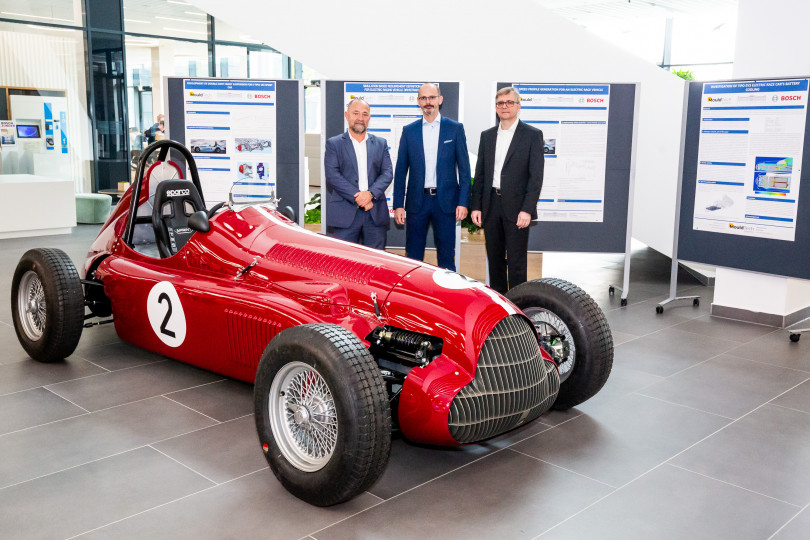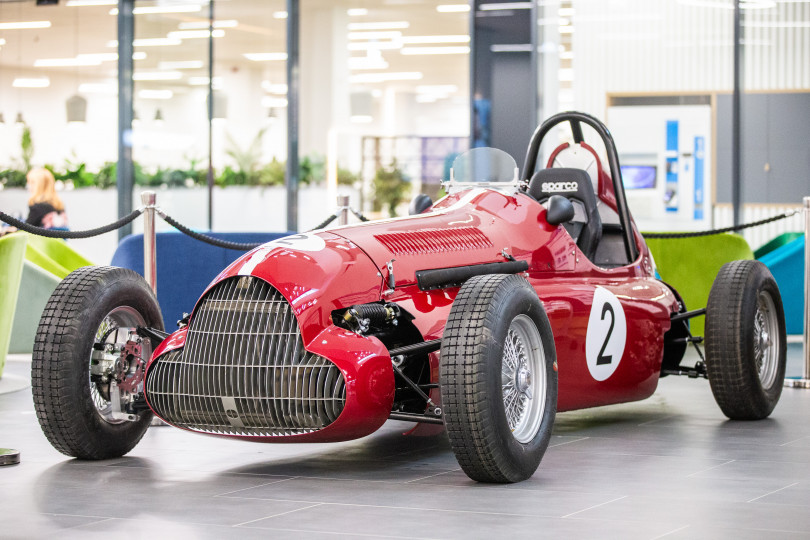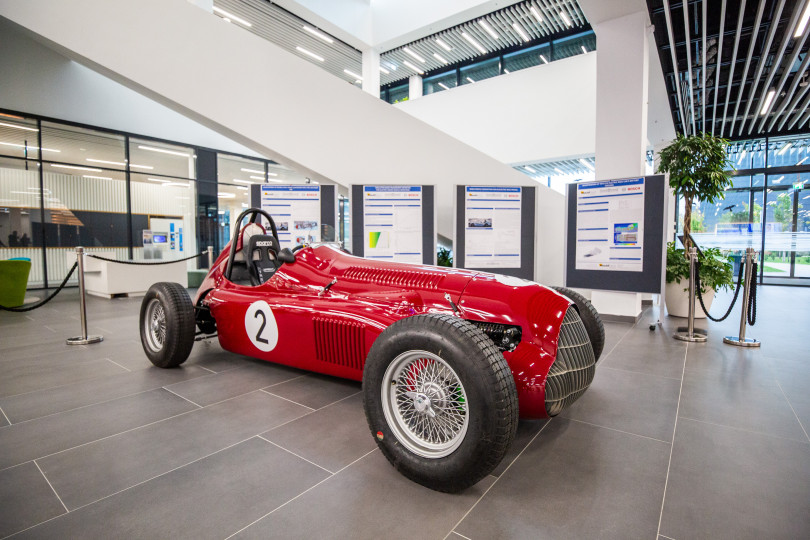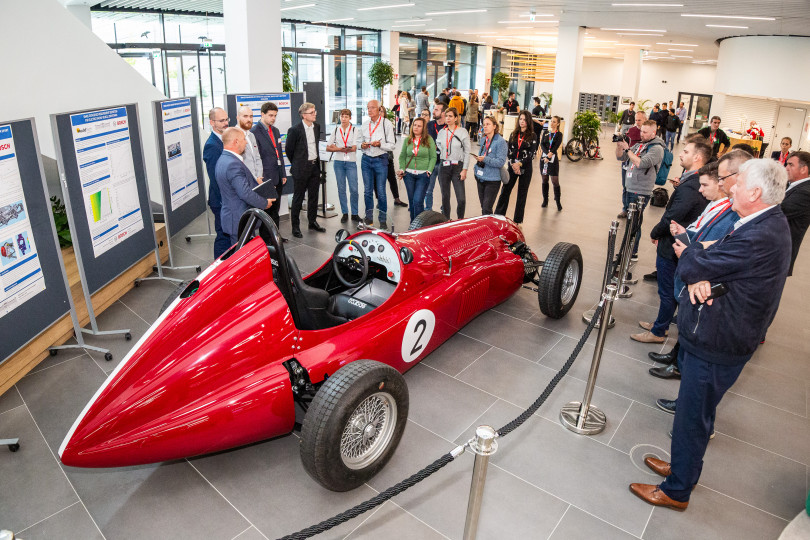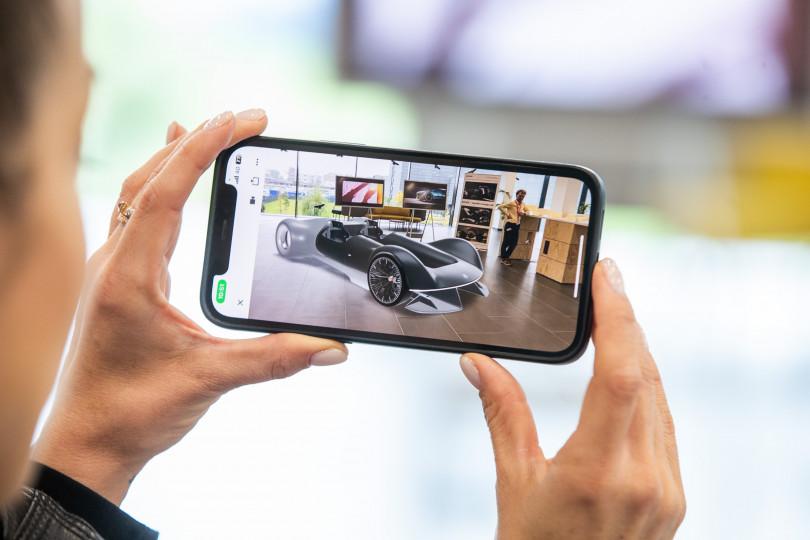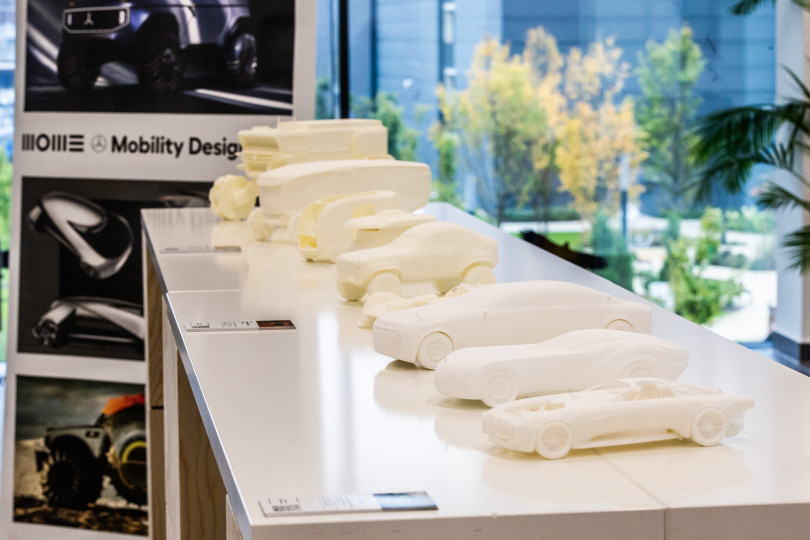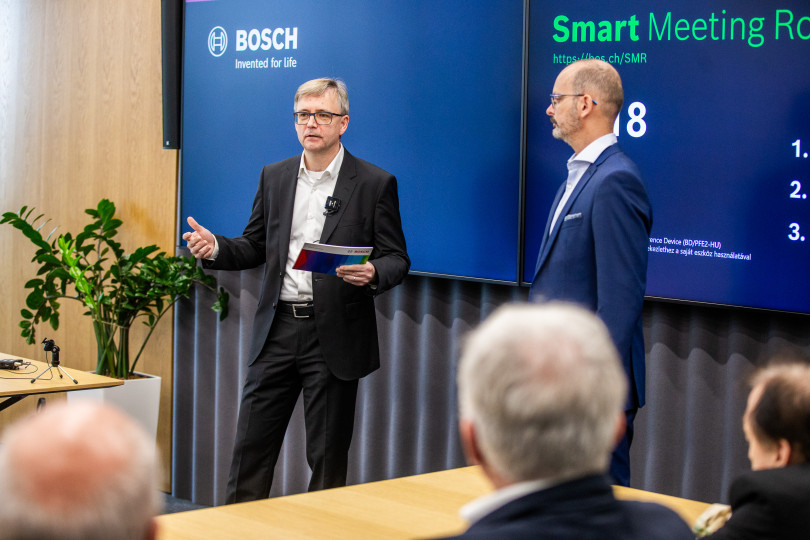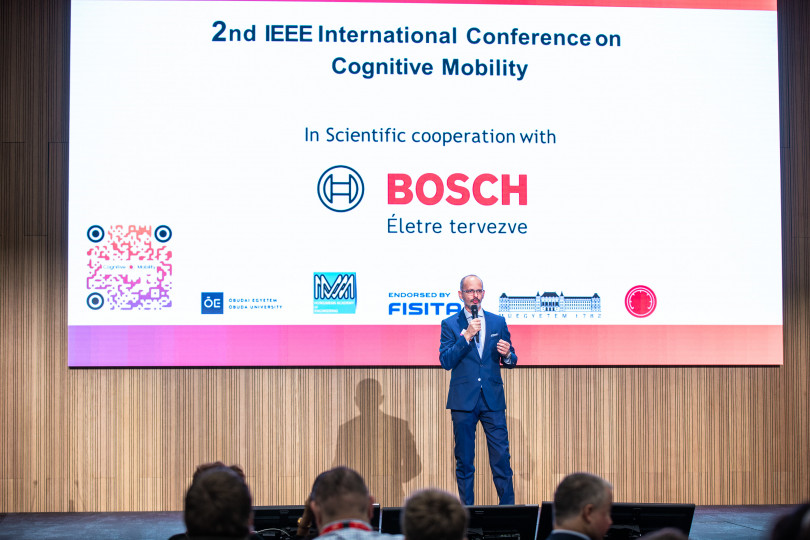Budapest – Cognitive mobility is one of the latest fields of science and it deals with the improvement of future vehicles and transport networks, for example through the use of artificial intelligence. How will cognitive mobility shape the cars and cities of the future? What role will artificial intelligence play in all of this? These are the questions that experts at the 2023 IEEE 2nd International Conference on Cognitive Mobility (short form: Cognitive Mobility 2023) at the Bosch Budapest Innovation Campus sought to answer.
The international conference on cognitive mobility, held for the second time in Budapest on 19–20 October, took a holistic approach to mobility, combining different scientific disciplines to focus on the most topical issues for more efficient and safer mobility. Nearly 40 papers were presented that covered topics such as traffic congestion on the motorways of the future, the influence of visual smog on drivers, parking reservation service development based on driving behavior in urban areas, and the impact of the seasons on cycling accidents. Participants also had the opportunity to gain insights into the practical application of cognitive mobility: the joint R&D project of the Bosch-BME Competence Center for Innovative Vehicle Technologies (which is an integral part of the Bosch innovation ecosystem and is located at BME, the Budapest University of Technology) and MouldTech Systems Kft. for the development of electric drivetrains was presented, as well as futuristic design concepts from the Mobility Lab of Moholy-Nagy University of Art and Design (MOME).
“Bosch as a leading automotive innovator is committed to developing intelligent solutions for vehicles and mobility, and we were delighted to participate in the conference as an organizer, speaker, and exhibitor, and to host the event at the Bosch Budapest Innovation Campus. Bosch's cognitive mobility solutions are already used by more than 50 automotive brands worldwide: we believe it is important to engage with academia in shaping the future of mobility, and the Cognitive Mobility 2023 conference was an excellent opportunity to do so,” said András Kemler, managing director of technical areas, and location manager at Robert Bosch Kft.
“As a leading higher education institution, it is a fundamental goal for BME not only to follow but also to shape the latest trends. Cognitive mobility provides an opportunity to bring together different disciplines in a mutually enriching way, thus creating more sustainable forms of mobility. These experiences are also incorporated into the curriculum, so the impact of the new approach is multiplied with the help of the students,” said Máté Zöldy DSc., professor at the Faculty of Transport Engineering and Vehicle Engineering, Budapest University of Technology and Economics.
A classic for the future: electric drive proves its worth in a classically shaped racing car
This spring, the Faculty of Transport Engineering and Vehicle Engineering at the Budapest University of Technology and Economics) inaugurated the Competence Center for Innovative Vehicle Technologies, part of the Bosch innovation ecosystem, with tools and simulation systems unique in Hungarian higher technical education. At the Cognitive Mobility 2023 conference, participants were also able to get a first-hand look at the exciting eTipo R&D project, a collaboration between the Bosch Group in Hungary and the Bosch-BME Competence Center for Innovative Vehicle Technologies and MouldTech Systems Kft.
The Cognitive Mobility conference was the first event where the second, improved generation of the eTipo electric racing car was shown. The design of test vehicle is reminiscent of the 1950s, but it is equipped with the latest powertrain technologies. The car also takes part in international hill-climbing events. A special feature of the vehicle shaped like a vintage Formula 1 racing car is that it is available for purchase globally as a kit car.
The components of the test vehicle's electric powertrain can be interchanged in a modular fashion and tested in real-life operation, allowing the various electric components to be measured more accurately and the powertrain's performance, thermal properties, and range to be optimized. Testing under extreme racing conditions also serves to ensure that the innovative solutions that will later go into series production are guaranteed to perform on the road.
Mobility as experience: transport and design
The Mobility Lab at the Moholy-Nagy University of Art and Design (MOME) also presented the results of its vehicle design project. Conference participants were given a glimpse into the vision of the future of transport: 3D models and designs that can be “walked around” with VR glasses showed the futuristic world of forms and shapes that MOME students have imagined for the vehicles of the year 2040. The Mobility Lab, a specialization of MOME's product design program, is part of the Micromobility education program offered in cooperation with the Budapest University of Technology and Economics. They design not only cars, but also, and above all, micromobility devices and mobility experiences by combining classic product design and high-tech. Bosch is supporting BME-MOME's project as an innovative partner, so that the creative designs may even take shape in the future.
Zita Hella Varga
Phone: +36 70 667-6374
Bosch has been present in Hungary since 1898 with its products. After its re-establishment as a regional trading company in 1991, Bosch has grown into one of Hungary’s largest foreign industrial employers with currently eight subsidiaries. In fiscal 2022 it had total net sales of 2.255 billion forints and consolidated sales to third parties on the Hungarian market of 314 billion forints. The Bosch Group in Hungary employs more than 18,300 associates (as of December 31, 2022). In addition to its manufacturing, commercial and development business, Bosch has a network of sales and service operations that covers the entire country.
The Bosch Group is a leading global supplier of technology and services. It employs roughly 421,000 associates worldwide (as of December 31, 2022). The company generated sales of 88.2 billion euros in 2022. Its operations are divided into four business sectors: Mobility Solutions, Industrial Technology, Consumer Goods, and Energy and Building Technology. As a leading IoT provider, Bosch offers innovative solutions for smart homes, Industry 4.0, and connected mobility. Bosch is pursuing a vision of mobility that is sustainable, safe, and exciting. It uses its expertise in sensor technology, software, and services, as well as its own IoT cloud, to offer its customers connected, cross-domain solutions from a single source. The Bosch Group’s strategic objective is to facilitate connected living with products and solutions that either contain artificial intelligence (AI) or have been developed or manufactured with its help. Bosch improves quality of life worldwide with products and services that are innovative and spark enthusiasm. In short, Bosch creates technology that is “Invented for life.” The Bosch Group comprises Robert Bosch GmbH and its roughly 470 subsidiary and regional companies in over 60 countries. Including sales and service partners, Bosch’s global manufacturing, engineering, and sales network covers nearly every country in the world. With its more than 400 locations worldwide, the Bosch Group has been carbon neutral since the first quarter of 2020. The basis for the company’s future growth is its innovative strength. At 136 locations across the globe, Bosch employs some 85,500 associates in research and development, of which nearly 44,000 are software engineers.
Additional information is available online at www.bosch.hu, iot.boschblog.hu, www.bosch.com, www.iot.bosch.com, www.bosch-press.com, www.twitter.com/BoschPresse

